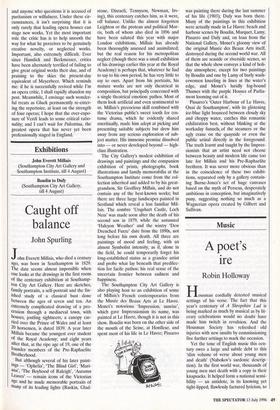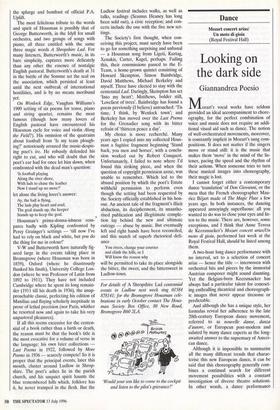Music
A poet's ire
Robin Holloway
Housman cordially detested musical settings of his verse. The fact that this year's centenary of A Shropshire Lad is being marked as much by musical as by lit- erary celebrations would no doubt have made him twitch in revulsion. And the Housman Society has refreshed old injuries with new insults by commissioning five further settings to mark the occasion.
Yet the tone of English music this cen- tury owes a large and subtle debt to this 'slim volume of verse about young men and death' (Nabokov's sardonic descrip- tion). In the first world war, thousands of young men met death with a copy in their knapsacks. It helped form a national sensi- bility — an antidote, in its knowing yet tight-lipped, flawlessly factured lyricism, to the splurge and bombast of official P.A. Uplift.
The most felicitous tribute to the words and spirit of Housman is possibly that of George Butterworth, in the Idyll for small orchestra, and two groups of songs with piano, all three entitled with the same three magic words A Shropshire Lad. For many listeners, Buttenvorth's music, in its bare simplicity, captures more delicately than any other the essence of nostalgic English pastoral. Butterworth's death at 31 in the battle of the Somme set the seal on the association, which persisted at least until the next outbreak of international hostilities, and is by no means moribund yet.
On Wenlock Edge, Vaughan Williams's 1909 setting of six poems for tenor, piano and string quartet, remains the most famous (though how many lovers of English pastoral have encountered his Housman cycle for voice and violin Along the Field?). His omission of the quatrains about football from 'Is my team plough- ing?' notoriously aroused the music-despis- ing poet's ire. He robustly defended his right to cut, and who will doubt that the poet's ear had for once let him down, when confronted with the dead man's question:
`Is football playing Along the river shore, With lads to chase the leather
Now I stand up no more?'
let alone the living lover's answer: Ay, the ball is flying, The lads play heart and soul; The goal stands up, the keeper Stands up to keep the goal.
Housman's prima-donna-ishness com- pares badly with Kipling confronted by Percy Grainger's settings — `till now I've had to rely on black and white, but you do the thing for me in colour!'
V-W and Butterworth have naturally fig- ured large in the events taking place in Bromsgrove (where Housman was born in 1859), Oxford (where he disastrously flunked his finals), University College Lon- don (where he was Professor of Latin from 1892 to 1911). They have not included Cambridge where he spent its long remain- der (1911 till his death in 1936), the unap- proachable classic, perfecting his edition of Manilius and flaying scholarly ineptitude in prose of lethal precision (nor Paris, whither he resorted now and again to take his very unpastoral pleasures).
If all this seems excessive for the centen- nial of a book rather than a birth or death, the reason must be that the book's title is the most evocative for a volume of verse in the language: his own later collections Last Poems in 1922, followed by More Poems in 1936 — scarcely compete! So it is proper that the principal events, later this month, cluster around Ludlow in Shrop- shire. The poet's ashes lie in the parish church, and his unquiet spirit haunts the blue remembered hills which, folklore has it, he never tramped in the flesh. But the
Ludlow festival includes walks, as well as talks, readings (Seamus Heaney has long been sold out), a civic reception; and con- certs include the one with the five new set- tings.
The Society's first thought, when con- ceiving this project, must surely have been to go for something surprising and unbanal — a Housman song from Ligeti, Kurtag, Xenakis, Carter, Kagel, perhaps. Failing this, their commissions passed to the E- Team, a home-grown quintet consisting of Howard Skempton, Simon Bainbridge, David Matthews, Michael Berkeley and myself. Three have elected to stay with the centennial Lad. Daringly, Skempton has set `Into my heart'; Matthews, bolder still, `Loveliest of trees'. Bainbridge has found a poem previously (I believe) untouched: `Tis time, I think, by Wenlock town'; and Berkeley has moved over the Last Poems for the Grenadier song with its bitter refrain of 'thirteen pence a day'.
My choice is more recherché. Many years ago I copied into my collected Hous- man a fugitive fragment beginning 'Stand back, you men and horses', with a conclu- sion worked out by Robert Conquest. Unfortunately, I failed to note where I'd found this striking piece, and when the question of copyright permission arose, was unable to remember. Which led to the absurd position by which the poet's Estate withheld permission to perform even though the setting had been requested by the Society officially established in his hon- our. An ancient tale of the fragment's illicit abduction, its decipherment, its unautho- rised publication and illegitimate comple- tion lay behind the new and ultimate outrage — abuse by music. But eventually left and right hands have been reconciled, and this snatch of superb rhetorical defi- ance
You rivers, change your courses and climb the hills, or I Will know the reason why will be permitted to take its place alongside the bitter, the sweet, and the bittersweet in Ludlow-town.
For details of A Shropshire Lad centennial events in Ludlow next week ring 01584 878141; for the Bromsgrove Housman cele- brations in early October contact The Hous- man Society Box Office, 80 New Roac4 Bromsgrove B60 2LA.
`Would your son like to come to the cockpit and listen to the pilot's grievance?'



































































 Previous page
Previous page